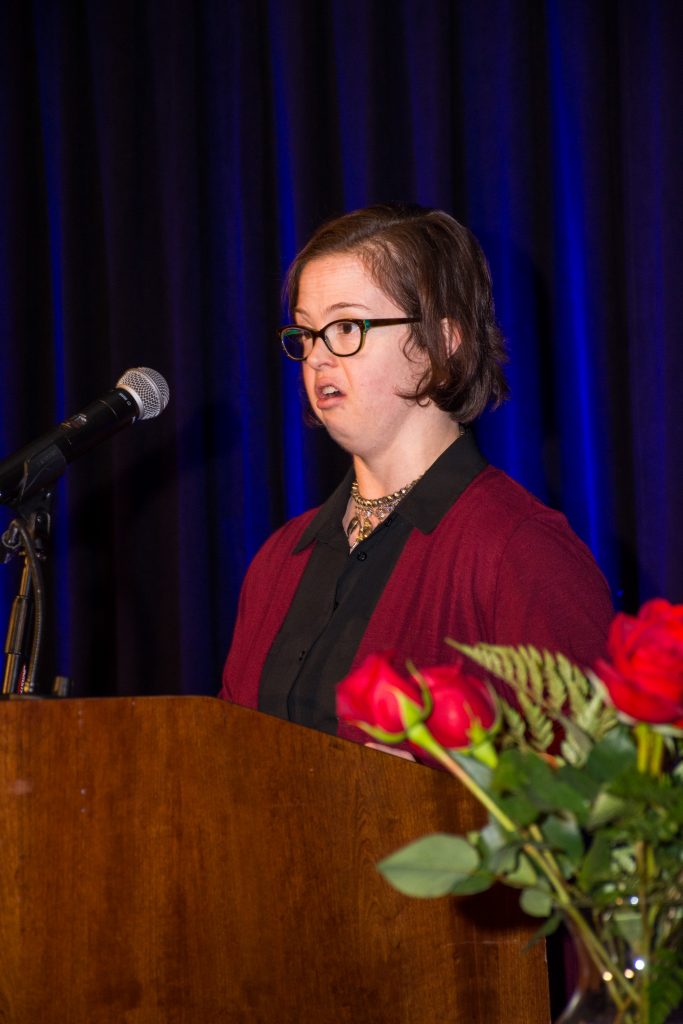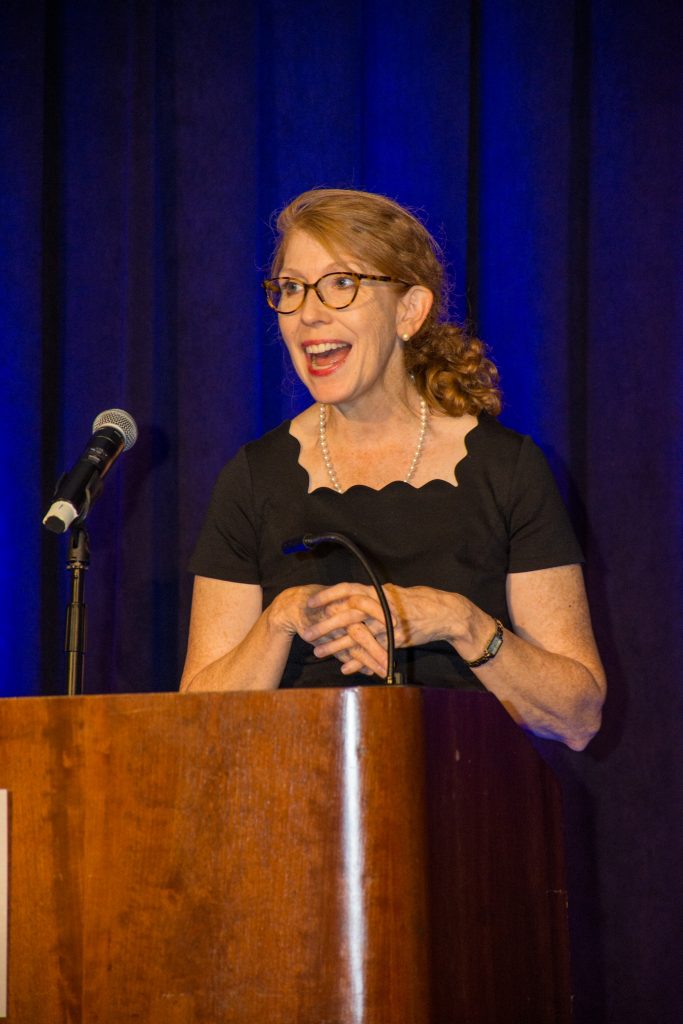October 8, 2018 // Special
Katie Shaw: ‘I’ve made the world a better place’
Down syndrome adult, advocate highlight the joy in every life
“I have a busy life — just like most of you,” said Katie Shaw, speaking to nearly 1,000 people at the St. Joseph County Right to Life benefit dinner Sept. 20. “It’s a wonderful life. I’ve made the world a better place.”
The 33-year-old Indianapolis resident, who has Down syndrome, concluded her remarks by quoting Psalm 139:14: “I praise you, because I am wonderfully made; wonderful are your works!”
Shaw’s accomplishments are many. She has studied dance, piano and violin, received sacraments at her parish, competed in softball, cross country and a mini-marathon, earned her GED diploma and an accreditation in early childhood education from Ivy Tech, and lost weight with the help of a personal trainer. She’s held jobs in child care and retail, and is currently loving her work at J.C. Penney. She also volunteers in several positions, including data entry at a Down syndrome organization and educating medical residents about her disability.

Indianapolis resident Katie Shaw, an adult with Down syndrome, addresses those in attendance at the St. Joseph County Right to Life 27th annual benefit dinner Sept. 20 at the Century Center in South Bend. — Photos by Mary Ivancsics
Raised in a pro-life family, Shaw said her mother’s obstetrician never suggested abortion. Her parents taught her and her siblings that “every life is a wonderful gift.”
“But not everyone sees that,” she admitted. So, she lobbied for state legislation outlawing abortion on the basis of race, gender or disability. Part of her life’s mission is to show skeptics what a wonderful life lies before a family whose baby has Down syndrome.
It was in testifying before the state senate that Shaw met Dr. Mary O’Callaghan, a Public Policy Fellow at the University of Notre Dame’s Center for Ethics and Culture. St. Joseph County Right to Life honored Dr. O’Callaghan during the evening’s events with its Pillar of Life award, after presenting the Annette M. Macknick Courage Award to Josh Comeau, a father of seven who has been valiantly battling cancer for the last four years.

Down syndrome advocate Dr. Mary O’Callaghan delivers the keynote address. O’Callaghan, the mother of a son with Down syndrome, has developed materials for the U.S. Conference of Catholic Bishops’ Respect Life program and served on the Disabilities Advisory Board for the Diocese of Fort Wayne-South Bend.
In her keynote address, O’Callaghan explained that she was an advocate for people with disabilities long before her youngest son, Tommy, was born with Down syndrome in 2007. Her summer job with residents of a group home 30 years ago, where adults with disabilities lived, “changed the course of my life forever.” The remarkable capacity of those adults for friendship led her to Ph.D. studies in developmental psychology at Notre Dame.
After experiencing miscarriage and stillbirth, Mary and her husband, John, were thrilled to welcome Tommy. “He was beautiful,” she recalled. “How could I mourn a child who lived?” Parenting Tommy strengthened her desire not only to protect those like him, but also to help others understand “this gift beyond all understanding.” It thrust them into the supportive Down syndrome community worldwide.
O’Callaghan spoke with horror of the consequences of advances in prenatal testing that may soon be able to identify not only Down syndrome, but also other rare and common genetic disabilities, even autism. This sophisticated testing has led to what has been termed a “search-and-destroy mission” against preborn children who are less than genetically perfect.
There is a double madness here, O’Callaghan said. Jerome LeJeune, who first identified the genetics of Down syndrome, said only “mad science” aims to kill the patient, rather than fight the disease. The second arm of this insanity is the reduction of a human heart and soul to a diagnosis, an impersonal set of symptoms. Surely a human life is worth more than its particular mixture of suffering and happiness, she asserted.
O’Callaghan said she finds it ironic that medicine, which claims to be evidence-based, ignores the evidence that over 90 percent of individuals with Down syndrome and their families — like Shaw — report that they are happy with their lives. Those lives have challenges, but people with Down syndrome have an immediate, lively capacity for love, and their suffering also has the capacity to draw unselfish love from their family members and friends.
The best news. Delivered to your inbox.
Subscribe to our mailing list today.






